China is one of the oldest civilizations on this planet, and it attracts many tourists every year. The Great Wall, the Forbidden City, the Terracotta Army, and the Bund are among its famous attractions. This year, China is offering visa-free entry to certain countries, which means it is becoming more open to tourists. I would say that this year is definitely a great opportunity to make your travel to China a reality!
However, what should you prepare to travel to China? How do you pay while you travel to China? Do Chinese people speak English? Is it safe to travel to China? Keep reading to find the answers to all these questions in this article.
1. Travel to China Checklist
Click here to download the complete Travel to China Checklist.
1-1. Essential Items
| No. | Item | Notes |
|---|---|---|
| 1 | Passport | Please check if it’s going to expire soon. |
| 2 | Chinese Visa | Please check if your citizenship qualifies for visa-free entry in Section 5 of this article. If not, you may need to apply for a Chinese visa. For more details, please click here. |
| 3 | Airplane Ticket | Please don’t forget to arrange travel insurance. |
| 4 | Clothes | Please check the weather in the cities you will be visiting. For information on China’s weather, please click here. |
| 5 | Mobilephone | Please keep the contact number of your country’s embassy in your contact book for any emergencies: U.S.A. +86 10 8531 3000 U.K. +86 10 5192 4000 Canada +86 10 5139 4000 Australia +86 10 5140 4111 Beijing hosts embassies from 175 countries. |
| 6 | Sim Card or Portable Wifi | Don’t worry! You can still access Facebook, Instagram, WhatsApp, and more in China if you use a tourist SIM card. |
| 7 | Back Bag | Please check if it meets your airline’s requirements. |
| 8 | Power Bank | This is quite essential for a long trip. Please make sure it meets your airline’s requirements. |
| 9 | Credit Card | Visa, MasterCard, and JCB can all be used in China! |
| 10 | Cash (RMB) | You can exchange some currency at airports in both your country and China. *According to Chinese customs regulations., each foreigner is allowed to carry a maximum of 20,000 RMB or the equivalent of 5,000 USD in foreign currency in cash per entry or exit. |
| 11 | Hotels | Booking your hotels online and printing the information page in advance is highly recommended, as Chinese customs may ask where you will be staying during your journey. *Some hotels in China may not be legally authorized to host foreign tourists. |
| 12 | Emergency Medicine and First Aid | Common medicines, such as aspirin, are generally acceptable. However, please check if the medications you are carrying are prohibited in China. For more details, please click here. |
| 13 | Suitable Shoes | This depends on the type of trips you will be taking. |
| 14 | Apple Map or Amap or Baidu Map | Please note that Google Maps generally does not work in China. |
| 15 | Translator Apps or Devices | Or at least print the phases below in case 1. 你会说英文吗?(Do you speak English?) 2. 我迷路了. (I’m lost.) 3. 我需要食物. (I need some food.) 4. 我需要水. (I need some water.) 5. 我需要医疗援助. (I need medical assistance.) 6. 请帮我报警. (Please call the police for me.) 7. 请帮我打120. (Please call an ambulance for me.) |
1-2. Additional
| No. | Item | Details |
|---|---|---|
| 1 | Driving Licence | Some countries’ driving permits are recognized in China. If you plan to go on a self-driving trip in China, please check the policy of your country. |
| 2 | Gifts | If you are visiting someone in China. |
| 3 | Wet Wipes | To stay clean in inconvenient situations. |
| 4 | Travel Pillow and Eye Mask | To relax comfortably during your journey. |
| 5 | Sunscreen and Hat | Ensure that your sunscreen and any other liquids are packed in your checked luggage, as they are not permitted in your carry-on. |
| 6 | Guidebook | Nowadays, many tourists get information online, but it can still be helpful to carry a guidebook with you. |
| 7 | Umbrella or Packable Rain Jacket | In case it starts to rain while you are traveling. |
| 8 | Laptop | If you need it for entertainment or work during your trip. |
| 9 | Emergency Food (Energy Bars, Dried Fruits, etc) | Although shopping is convenient in China, it’s still a good idea to have some emergency food with you. |
| 10 | Travel Grooming Kit | Hotels of course provide grooming supplies, but it’s better to bring your own if you have specific preferences. |
| 11 | Personal Care | Include items such as sanitary pads, shaving cream, and deodorant. |
| 12 | Laundry Bag | To keep dirty clothes separate from clean ones. |
| 13 | Books | Reading books on the way can be really relaxing. |
| 14 | Noise-canceling Earplugs | To create a quiet environment for yourself anywhere. |
| 15 | Water bottle | You can fill your water bottle with drinkable tap water while waiting for your plane, avoiding the need to buy expensive bottled water. |
2. Places to Visit in China
As this is not intended to be a comprehensive guide to attractions in China, I can’t provide a very detailed travel plan. However, I hope this basic outline will be helpful. Hopefully, this can inspire you with some ideas to travel to China. Let’s get started!
2-1. Metropolitan Areas and Modern cities
Shanghai: The largest city in China and one of the most famous cities in the world.
Guangzhou: The third-largest city in China, known for its high level of international influence.
Shenzhen: The fourth-largest city in China, often considered the window into China’s economic revolution.
Hong Kong: Asia’s financial center and one of the most famous cities in the world.
*Hong Kong has a different visa policy from mainland China.
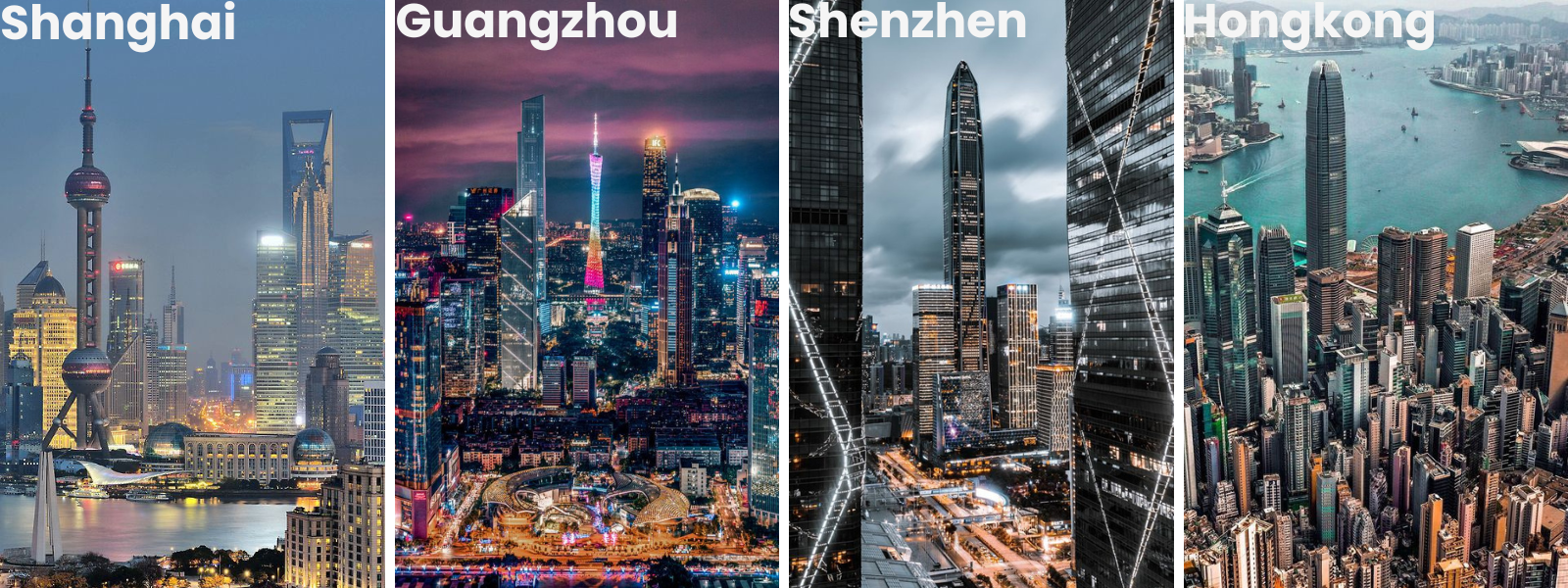
2-2. Chinese History and Ancient Sites
Beijing: The capital city of China and the center of politics and culture, home to the Forbidden City and the Great Wall.
Xi’an: An ancient capital of several dynasties, known for the Mausoleum of the First Qin Emperor and the Terracotta Army.
Suzhou: Famous for its classical Chinese gardens and water towns.
Luoyang: An ancient capital of thirteen dynasties, notable for the Longmen Grottoes and White Horse Temple.
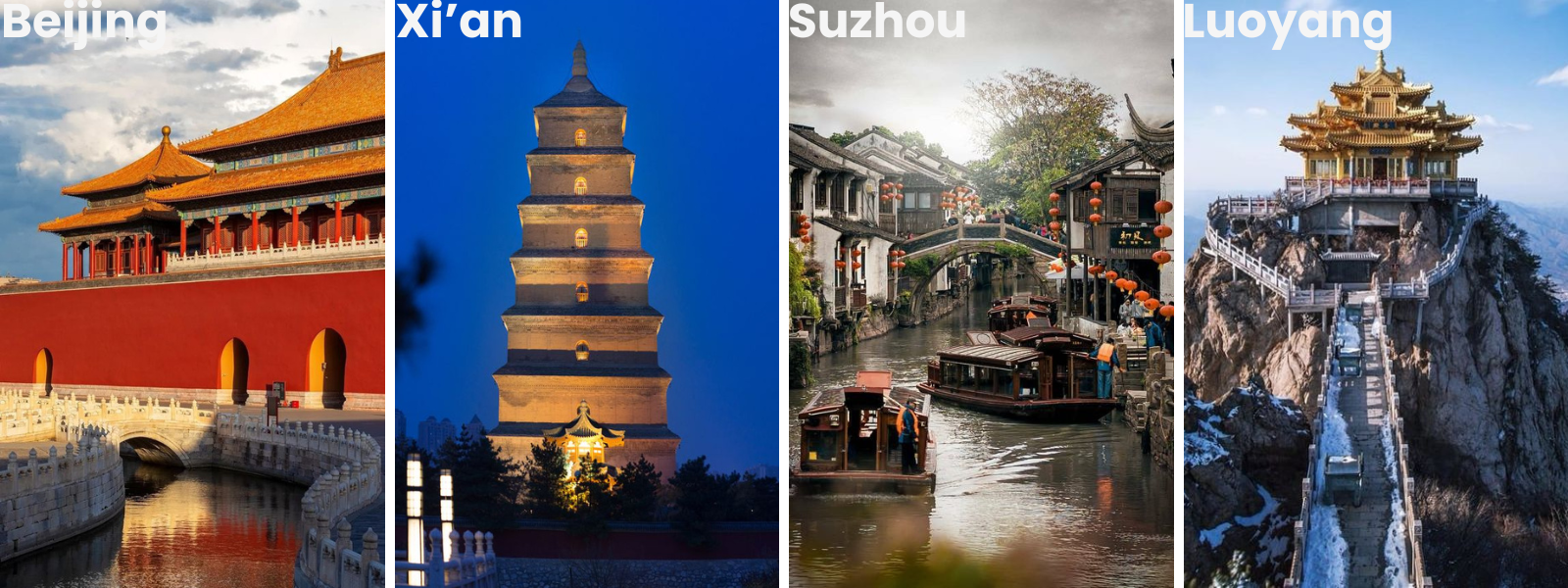
2-3. Natural Journeys
Guilin: Renowned for its stunning mountains and rivers.
Chengdu: Famous as the home of the giant panda.
Qujing: Known for the Nine Dragon Waterfall, sunflower fields, and its proximity to Shangri-La.
Hulunbuir: Home to vast, boundless grasslands.

2-4. Diversity
Dunhuang: Home to the Mogao Caves, the Silk Road, and Crescent Lake.
Kashgar: Known for Uyghur culture and customs, with a Central Asian vibe.
Lhasa: Revered as the “city closest to heaven,” rich in Tibetan culture and customs.
Xishuangbanna: An autonomous prefecture for the Dai people, with strong influences of Thai culture.

2-5. Peaceful Coastal Cities
Qingdao: A major port city known for its German architecture.
Sanya: Famous for having some of the best beaches in China.
Xiamen: An island city renowned for its tea culture.
Beihai: Known for the beautiful Silver Beach.
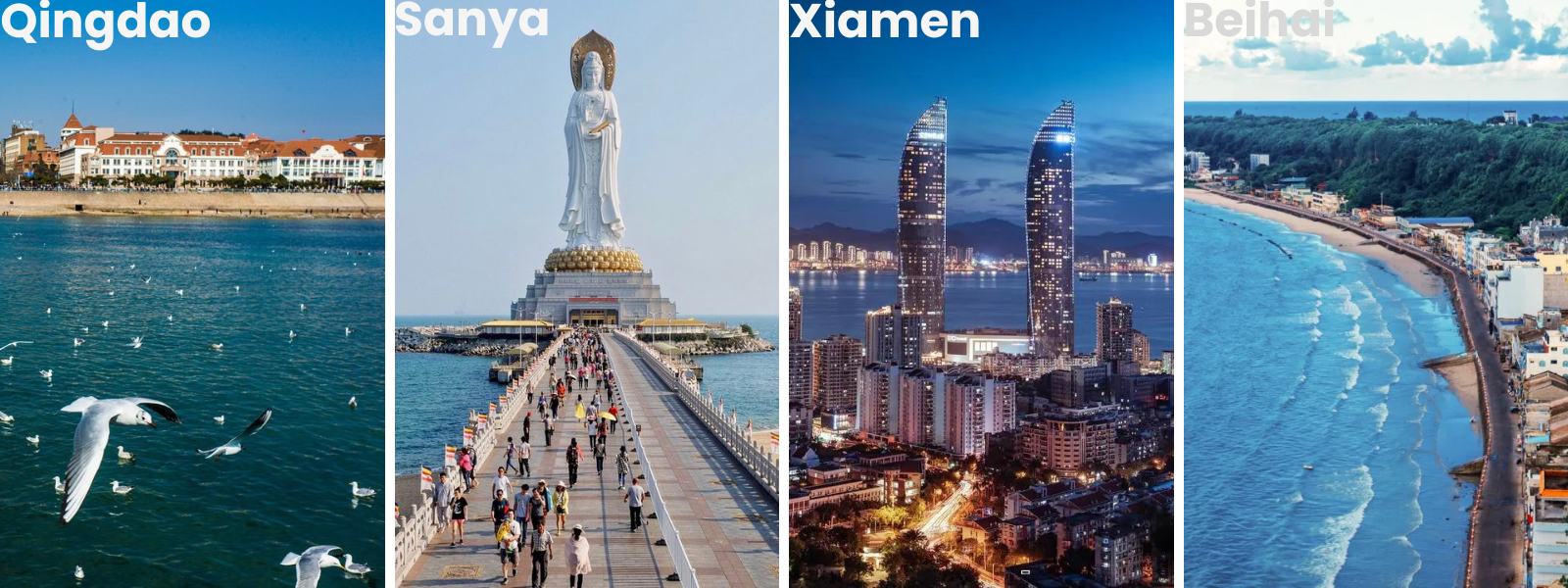
2-6. Winter Besties
Harbin: Famous for its Ice Festival and Russian cultural influences.
Changbaishan: Known for its volcanic landscape and hot springs.
China Snow Town: Renowned for its abundant snow.
Zhangjiajie: Home to a stunning national forest park.

Apart from these recommendations, there are countless other places worth visiting! Even as a Chinese citizen, I don’t know all the nice places. Please try to make a plan for your travel to China based on your budget, time, and the season.
3. How to pay for things when travel to China
3-1. Cash
You may have heard that China is a cashless society where people often use electronic payment methods like Alipay and WeChat Pay. While this is true, you can still pay with cash when you travel to China. In fact, it is illegal for vendors to refuse cash payments.
3-2. Alipay
For convenience, registering for some payment apps in advance is highly recommended. These apps can also assist you with various public services, such as trains and buses. Here, I will guide you on how to use Alipay.
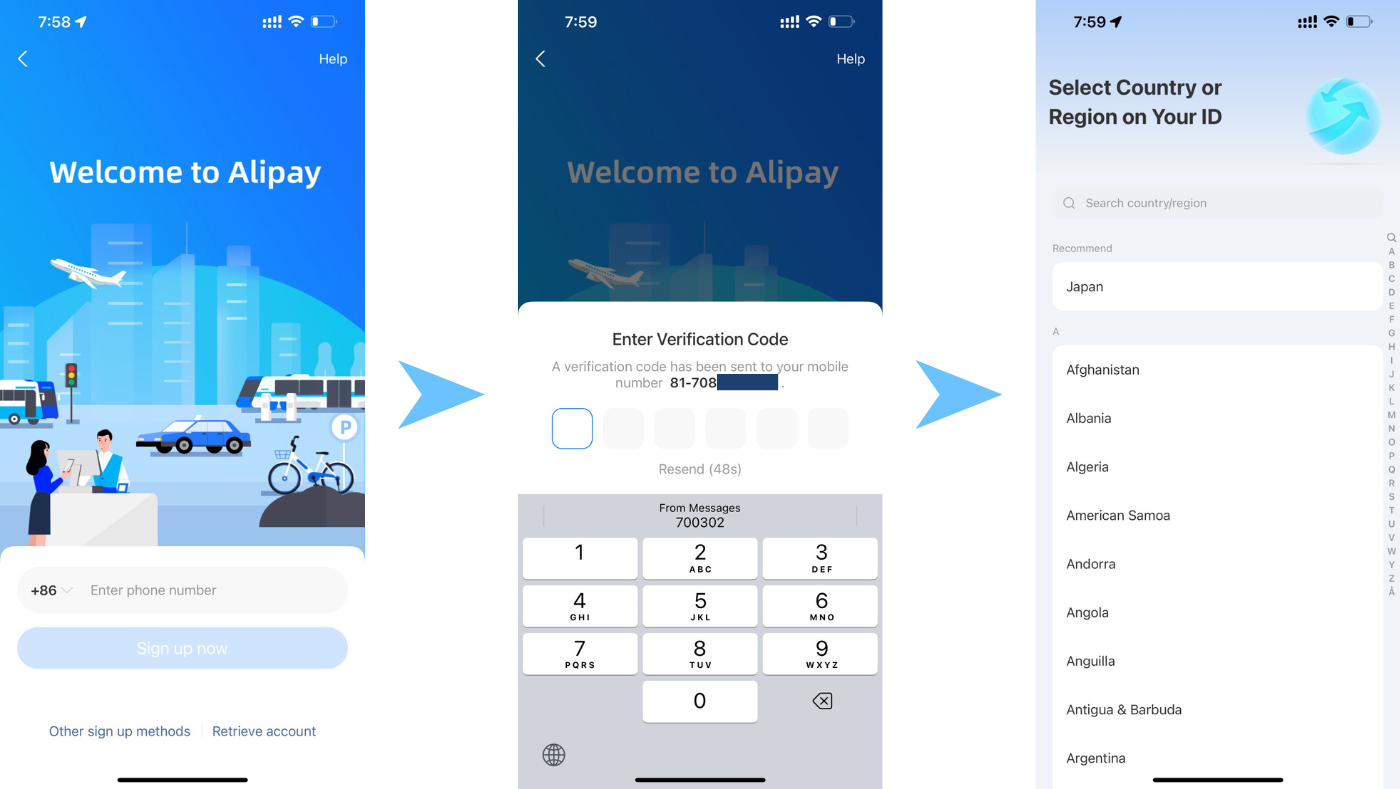
First, download the “Alipay” app, which requires your phone number for registration.
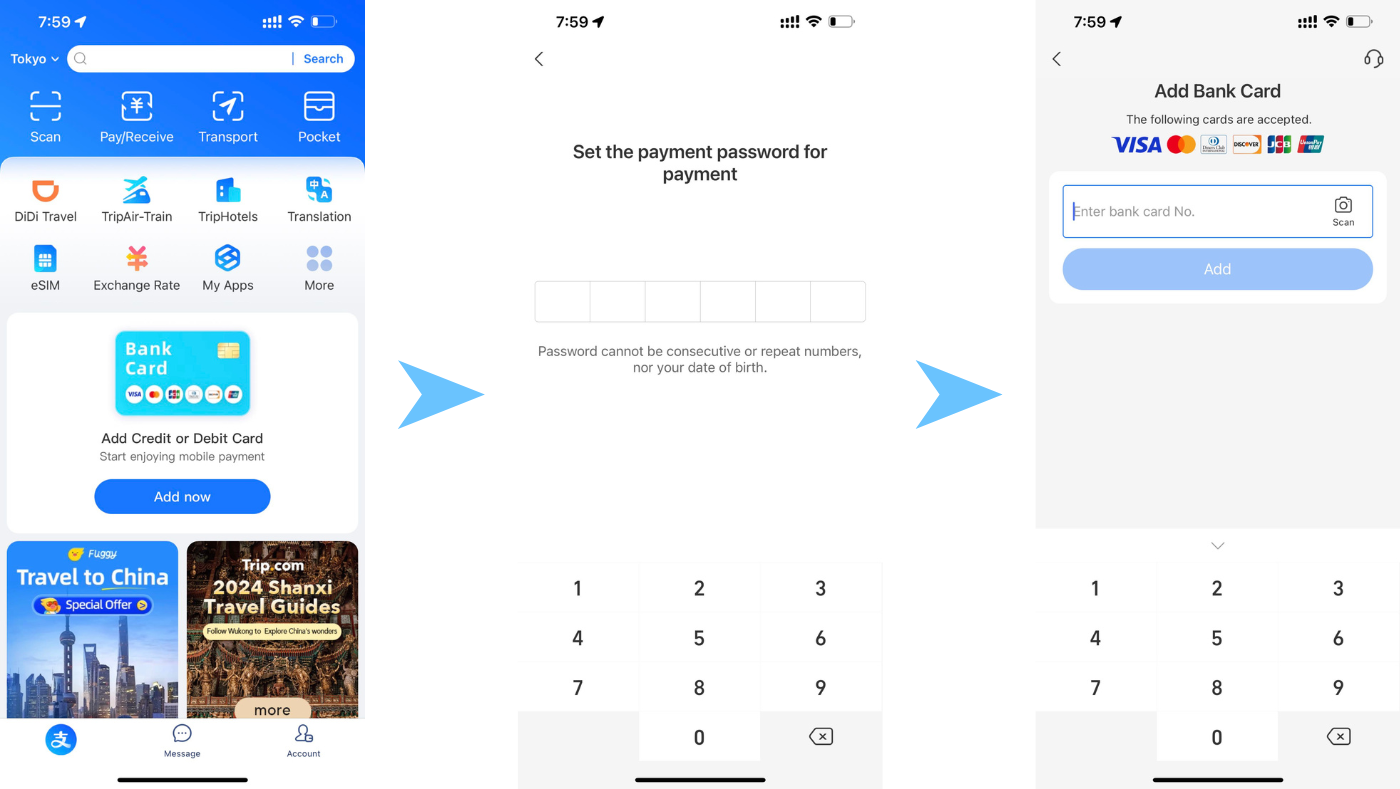
Next, you need to set a payment password for the Alipay app. This does not have to be the same as your card’s password. In addition, you need to link at least one bank card to your Alipay account; both debit and credit cards are acceptable.
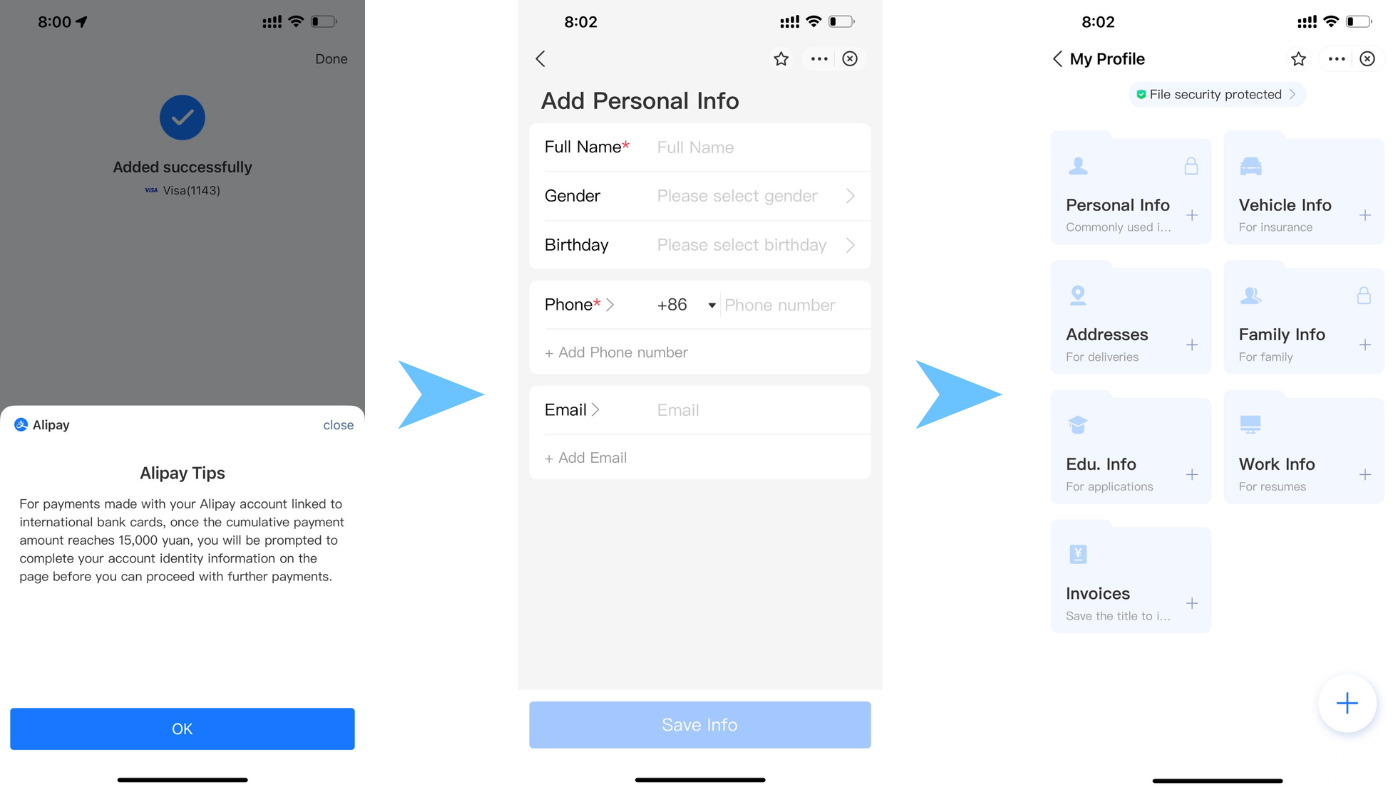
Please note that once the cumulative payment amount reaches 15,000 yuan, you will be prompted to complete additional identification to continue using the app.
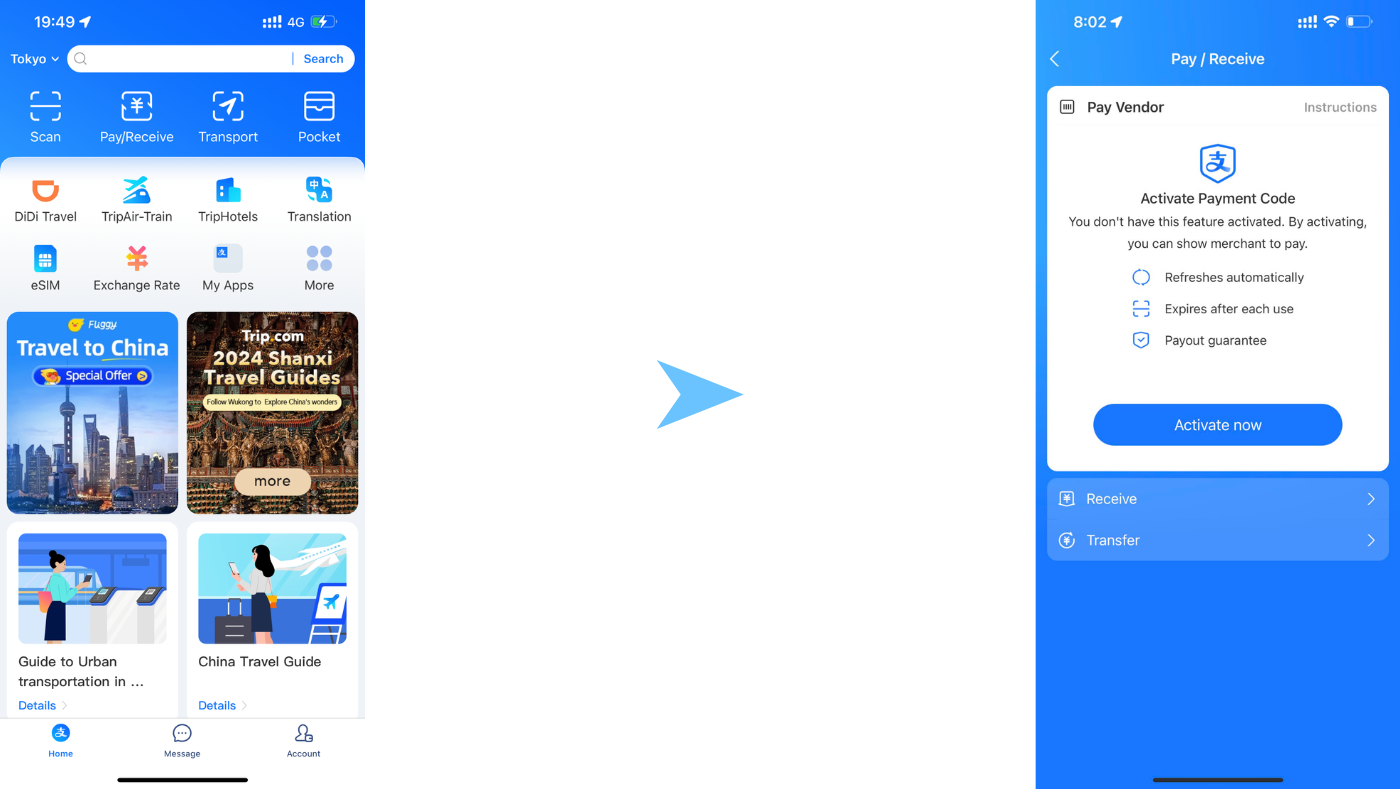
Once you activate the Payment Code in the app, you can start using it to pay for anything in China. It offers a great deal of convenience!
3-3. WeChat Pay
WeChat Pay is also a very common payment method in China. However, I wouldn’t recommend it for tourists, even though I use it more frequently myself. Why? Because WeChat is not just a payment app like Alipay; it’s also a social app. When you try to register for WeChat, it may require additional procedures, such as having a friend verify your account.
If you still want to create a WeChat account, please check here. If you already have a WeChat account, the payment process is similar to Alipay.
4. Common Q&A for Travel to China
4-1. Do you tip in China?
Not at all. Tipping is not customary in China.
4-2. Do Chinese people speak English?
Chinese people generally do not speak English as fluently as some other non-native English speakers, such as Germans or Filipinos. You shouldn’t expect high proficiency when talking to reception staff. However, many young people in China can speak English to some extent and may be glad to assist you. Besides, with advanced translation technology, language barriers have become less of an issue.
4-3. Are Chinese people friendly?
Yes, don’t worry. Chinese people are mostly friendly to foreign tourists.
4-4. Is it safe to travel to China?
You do not need to worry much about safety in China. According to Global Finance Magazine, China ranks 26th out of 134 countries in terms of safety.
4-5. Can I drink tap water in China?
No, you can not drink tap water directly in China. However, you can boil it using a kettle, which hotels typically provide. Alternatively, you can drink bottled water.
4-6. Is there any service for disabled people in China?
Yes, services for disabled people are available in hotels, trains, and other public institutions. These services include more than just wheelchairs and guides.
4-7. Do children need to pay for train tickets or resort admissions?
Children shorter than 1.3 meters can travel by train or visit resorts for free. Those between 1.3 and 1.5 meters in height are eligible for a 50% discount. Children’s height will be measured on-site.
4-8. Can I find halal restaurants when travel to China?
Yes, you can find halal restaurants in cities of all sizes throughout China.
4-9. Can I find Indian vegetarian or kosher restaurants in China?
Indian vegetarian and kosher restaurants are not very common, but you can find options in regular restaurants. Many places offer a variety of dishes that can accommodate dietary preferences.
4-10. Are there fast-food chains like McDonald’s, KFC, or Burger King in China?
Yes, you can find these fast-food chains in every town in China.
4-11. Is LGBT legal in China?
Yes, LGBT activities are legal in China, but social customs and attitudes may vary.
4-12. Can you take photos at attractions, museums, and other places in China?
In general, you can take photos, but policies vary by location. Please follow the specific guidelines at each place.
4-13. May you have more questions?
Please leave a comment, and I would be happy to answer as many questions as I can.
5. Countries that can visit China visa-free
Normal passports usually have different visa policies compared to diplomatic passports. As this article aims to help a wider audience, I will only list the visa policies for regular passports.
*Countries marked with “★” in the list have a visa-free policy until September 30, 2025.
*The table below is updated as of 1 September 2024. However, please note that the information in this table may NOT be entirely accurate. Be sure to conduct further research to confirm whether your country’s regular passports are eligible for visa-free entry to China.
| NO. | COUNTRY / REGION |
|---|---|
| 1 | Albania |
| 2 | UAE |
| 3 | Antigua and Barbuda |
| 4 | Barbados |
| 5 | Bahamas |
| 6 | Belarus |
| 7 | Bosnia and Herzegovina |
| 8 | Dominica |
| 9 | Equator |
| 10 | Fiji |
| 11 | Grenada |
| 12 | Georgia |
| 13 | Kazakhstan |
| 14 | Qatar |
| 15 | Maldives |
| 16 | Mauritius |
| 17 | Serbia |
| 18 | Seychelles |
| 19 | San Marino |
| 20 | Suriname |
| 21 | Thailand |
| 22 | Tonga |
| 23 | Singapore |
| 24 | Armenia |
| 25 | Germany ★ |
| 26 | France ★ |
| 27 | Netherlands ★ |
| 28 | Italy ★ |
| 29 | Switzerland ★ |
| 30 | Ireland ★ |
| 31 | Hungary ★ |
| 32 | Belgium ★ |
| 33 | Luxembourg ★ |
| 34 | Spain ★ |
| 35 | Malaysia ★ |
| 36 | Austria ★ |
Visa-free entry does not equate to an unlimited stay or residence in China. According to the regulation, visa-free entry generally allows for a stay of no more than 30 days. If a passport holder needs to stay longer than 30 days, they should apply for residence procedures locally as soon as possible.
6. Conclusion
Here it is! I hope you find this article useful. As you can see, China is a country rich in nature, history, and modern life. You don’t need to worry too much about your travel to China. Additionally, China is suitable for both solo trips and group trips, depending on your preferences.
If you are a beginner or traveling with your family, I highly recommend joining a group tour. For those who are more experienced, a customized travel to China might be a better option. Trust me, you’ll find that China offers a unique and rewarding travel experience. Enjoy your journey and embrace all the wonderful experiences that await you!



